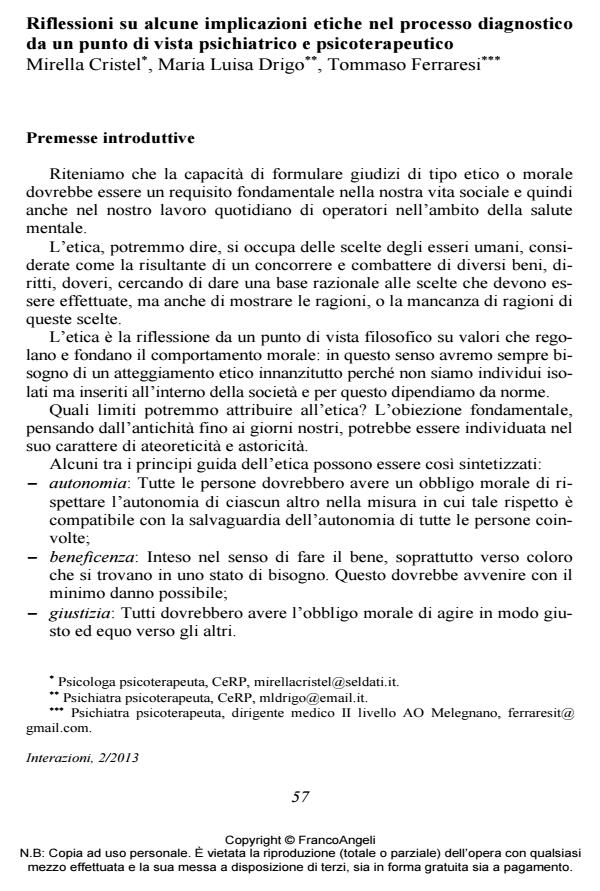Reflections about some ethical implications in the diagnostic process from a psychiatric and psychotherapeutic point of view
Journal title INTERAZIONI
Author/s Mirella Cristel, Maria Luisa Drigo, Tommaso Ferraresi
Publishing Year 2014 Issue 2013/2
Language Italian Pages 14 P. 57-70 File size 769 KB
DOI 10.3280/INT2013-002005
DOI is like a bar code for intellectual property: to have more infomation
click here
Below, you can see the article first page
If you want to buy this article in PDF format, you can do it, following the instructions to buy download credits

FrancoAngeli is member of Publishers International Linking Association, Inc (PILA), a not-for-profit association which run the CrossRef service enabling links to and from online scholarly content.
The authors have taken some clinical cases as a starting point for reflecting about how the diagnosis of a mental disorder could have relapses which complicate the treatment course. The diagnosis, or more properly the diagnostic process, should be a research of sense and meaning of the patient’s suffering. According to the authors, even from an ethical point of view, this way of proceeding let them establish a shared truth in the patient-doctor’s relationship, principally thinking of the person and not only the illness. As a consequence, from this perspective, it cannot relieve of considering the effects of it on family ties and balance, on the pharmacological therapy, on the patient’s rights and on the right to follow the treatment. Concluding, another question raises concerning the difficulty to come to an agreement between the diagnosis of serious ideologised criminal behaviours and the risks that result from them.
Keywords: Ethics, diagnosis, cure, tie, truth, DSM IV
- Aspinwall L.G., Brown T.R., Tabery J. (2012). The Double-Edged Sword: Does Biomechanism Increase or Decrease Judge’s Sentencing of Psycopaths?, Science, vol. 337, 6096: 846-849. DOI: 10.1126/science.121956
- APA (1996). Introduzione al DSM IV. Milano: Masson.
- Barnà C.A., Corlito G. (2011). Emergenza borderline. Milano: Angeli.
- Binswanger L. (1927). Per un’antropologia fenomenologica. Milano: Feltrinelli, 1970.
- Blankenburg W. (1971). La perdita dell’evidenza naturale. Milano: Cortina, 1998.
- Cargnello D. (1977). Alterità e alienità. Milano: Feltrinelli.
- Colucci M. (2013). Fabrizio con una zeta. Per una critica della ragione diagnostica, Aut Aut, 357: 5-20.
- Coppo P. (1996). Etnopsichiatria. Milano: Il Saggiatore.
- Cristel M., Drigo M.L., Taccani S. (2012). “I terapeuti tra ingranamento ed estraneità di fronte alla potente immobilità familiare”, relazione presentata al Convegno internazionale AIPCF Lo Psicoanalista di fronte alle famiglie e alle coppie del XXI° secolo: nuove sfide tecniche, Padova 25-28 luglio.
- Jaspers K. (1913). Psicopatologia Generale. Roma: Il Pensiero Scientifico, 1965.
- Kant I. (1785). Fondazione della metafisica dei costumi. In: Chiodi P. (a cura di), Scritti morali. Torino: Utet, 1970.
- Kleinman A. (2012). Culture, Bereavement and Psichiatry, The Lancet, vol. 379, 9816: 608-609, 18 February. DOI: 10.1016/S0140-6736(12)60258-
- Kristeva J., Vanier J. (2011). Il loro sguardo buca le nostre ombre. Roma: Donzelli.
- Mc Williams N. (1994). La diagnosi psicoanalitica. Roma: Astrolabio, 1999.
- Pazzagli A., Rossi Monti M. (1999). Psicoanalisi e diagnosi psichiatrica. In: Berti Ceroni G., Correale A. (a cura di), Psicoanalisi e psichiatria. Milano: Cortina.
- Petrella F. (1993). Turbamenti affettivi e alterazioni dell’esperienza. Milano: Cortina.
- Reich W. (1991). La diagnosi psichiatrica come problema etico. In: Bloch S., Chodoff P., (a cura di), Etica in psichiatria. Roma: La Nuova Italia Scientifica, 1995.
- Rossi Monti M. (1999). “Il mito della fondazione nosografica delle terapie”, relazione presentata al Convegno organizzato dall’Istituto Fatebenefratelli, S. Colombano al Lambro (MI)
Mirella Cristel, Maria Luisa Drigo, Tommaso Ferraresi, Riflessioni su alcune implicazioni etiche nel processo diagnostico da un punto di vista psichiatrico e psicoterapeutico in "INTERAZIONI" 2/2013, pp 57-70, DOI: 10.3280/INT2013-002005